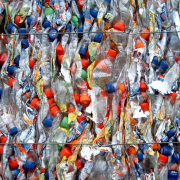Wind of Change in Africa
The African Union – the organization represents all sovereign states on the continent – has the vision that African countries will be recycling at least 50 percent of the urban waste they generate by 2023 and grow urban waste recycling industries.
With an area of about 30,000,000 square kilometers and a growing population of more than 1.2 billion, Africa is the world’s second largest continent. And with an estimated GDP (gross domestic product) of 5.5 trillion US-Dollar – corresponding nearly 4,600 US-Dollar per capita – in 2015, the continent is an economic area with rising importance. However, Africa has to face development challenges, as the urban population is increasing at a rate of 3.5 percent per annum. One aspect is the waste management, which is driven not only by population growth but also by changing consumption habits, production patterns and global waste trade.
“Recycling only four percent of the waste it generates, Africa has become a dumping ground for waste, particularly hazardous waste, often from developed countries,” the South Africa based Council for Scientific and Industrial Research (CSIR) stated when it announced the “first waste management outlook for Africa”; this report was released by the United Nations Environment Programme (UNEP) and CSIR.
To address the challenge regarding waste management, there are policies and strategies for Africa. The African Union published the “Agenda 2063: The Africa We Want” in 2013 and a popular version in 2015. It is a strategic socio-economic transformation framework for the continent and emphasizes sustainable development. “The Agenda 2063 Implementation Plan (2014–2023) outlines specific goals to be achieved during the first ten years, including reference to the expected transformation of waste management,” the authors of the “Africa Waste Management Outlook” inform. One target is a recycling rate of 50 percent regarding urban waste by 2023.
The “Libreville Declaration on Health and Environment in Africa” was signed in 2008 in Libreville (Gabon) as a commitment to protect human health from environmental degradation. According to the information, it reaffirms African countries’ commitment to the implementation of the Bamako Convention on the “Ban of the Import into Africa and the Control of Transboundary Movement of Hazardous Wastes within Africa (1991)” and the Bali Declaration on “Waste Management for Human Health and Livelihood (2008)”.
In 2011, the East African Community Development Strategy outlined broad strategic goals for the region for the period from 2011/12 to 2015/16. “The strategy recognizes a lack of effective legislation, inadequate funds and services for municipal waste management, and the low priority given to solid waste management, as major challenges facing member countries”, the reader can learn. Although the strategy does not have a recommended strategic intervention on waste management in general, a development objective includes the harmonization of policy interventions on the management of plastics and plastic waste and the establishment of an electronic waste (e-waste) management framework.
The Regional Indicative Strategic Development Plan of the Southern Africa Development Community (SADC) is a framework aimed at guiding the integration agenda over the period 2005–2020. The objective of the Plan is to deepen integration in the region so as to accelerate poverty eradication and the attainment of other economic and non-economic development goals. SADC recognizes major causes of poor waste management in Southern Africa.
In 2012, the Economic Community of West African States (ECOWAS) developed a draft e-waste regional strategy. Its main objectives were to strengthen existing institutional frameworks for collaboration in controlling the importation of used electrical and electronic equipment (EEE) and to encourage cooperation between different government agencies and the three tiers of government in ECOWAS States, African countries and regional organizations. The Community of West African States also developed a draft regional strategy on chemicals management and hazardous waste in 2015 and a draft strategy on plastic waste management in 2016, the authors of the UNEP report gave account.
https://au.int/sites/default/files/pages/3657-file-agenda2063_popular_version_en.pdf
www.csir.co.za/first-waste-management-africa
www.wedocs.unep.org/handle/20.500.11822/25515
Photo: pixabay
GR 3/2018








